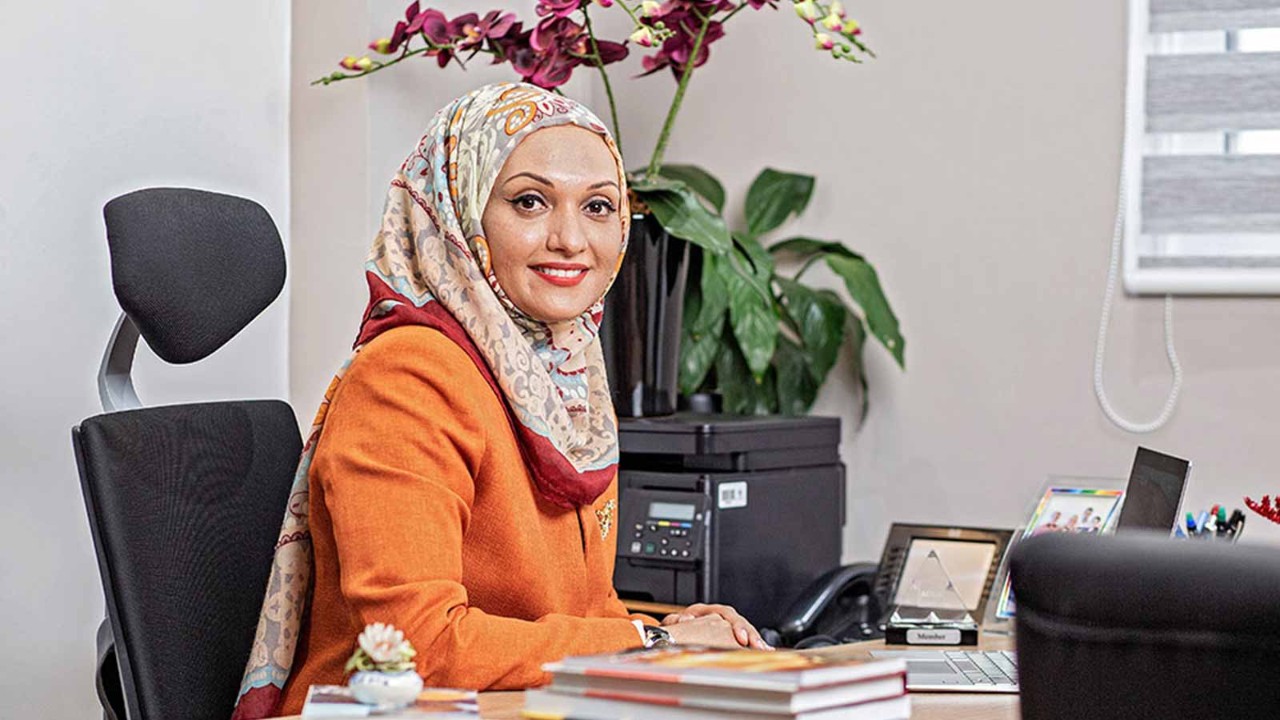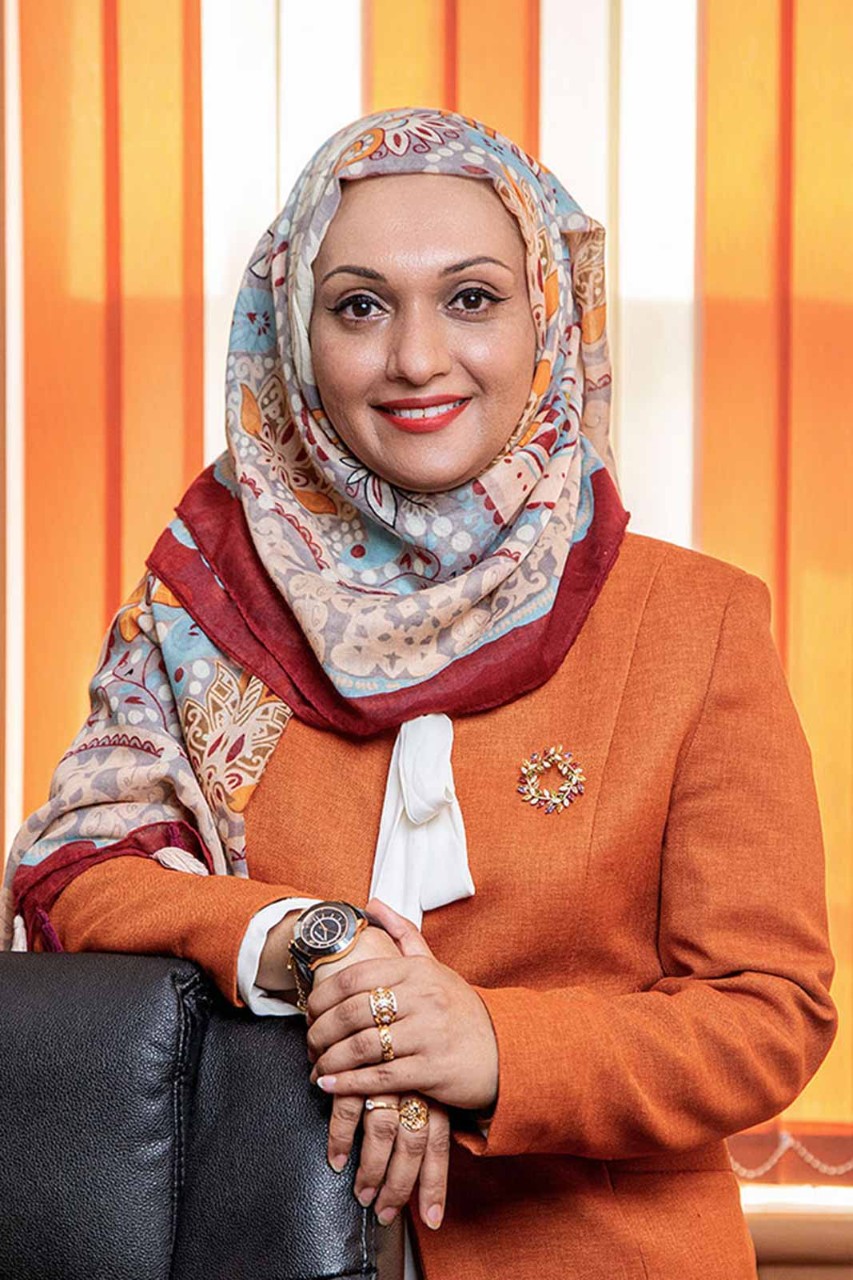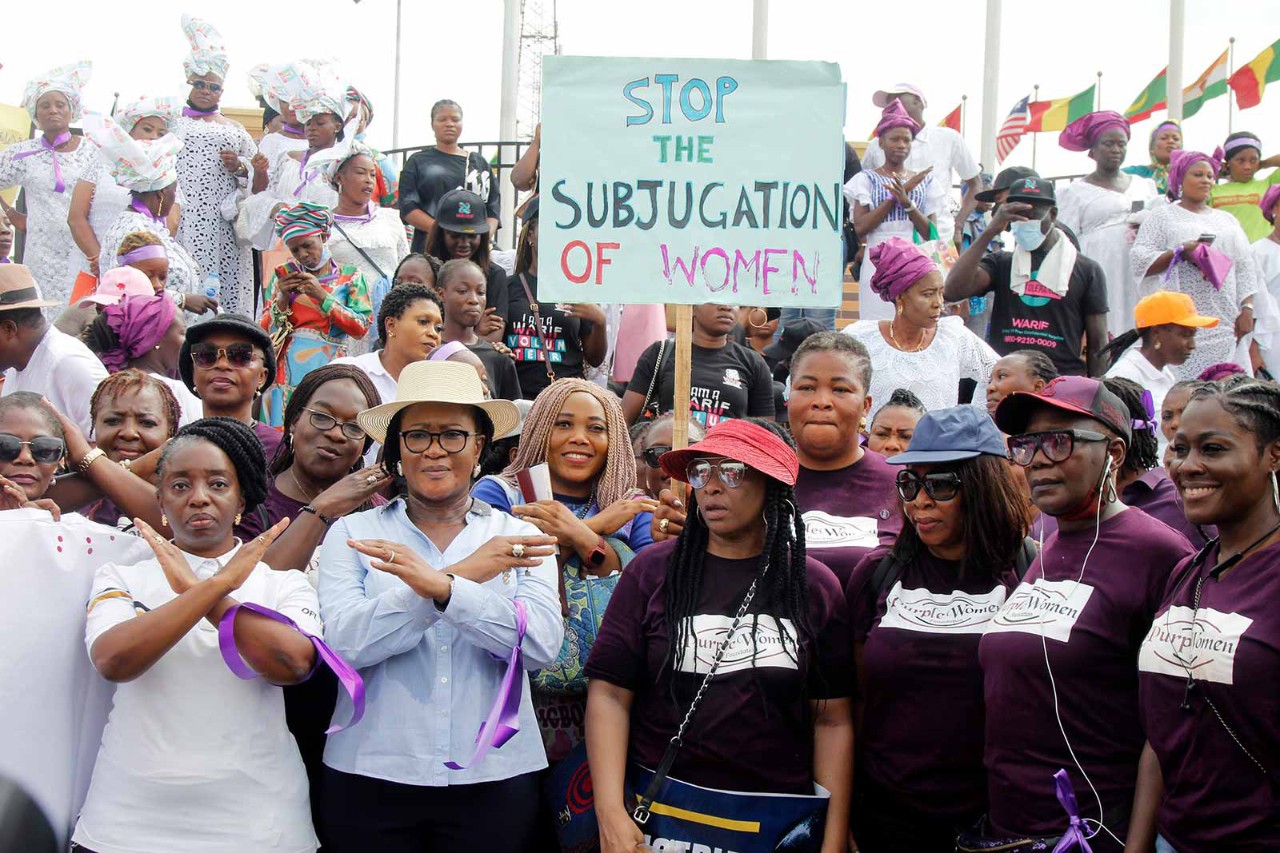
When Toseef Din FCCA joined MP Shah Hospital in Nairobi, Kenya in late 2011, thoughts of becoming its chief executive were far from her mind. ‘I had always liked my figures, my balance sheet,’ she says. ‘The journey happened so fast for me.’ In just a decade, she has progressed through the ranks from head of finance to chief operating officer and now CEO, responsible for delivering an ambitious strategy. ‘I grew into the role,’ she explains simply. ‘But it was my finance foundation that helped me venture into this room.’
The not-for-profit hospital, set up as a nursing home in the early 1930s by prominent businessman and philanthropist Meghji Pethraj Shah, has also grown considerably over the period. In 2010 it had 72 beds; now there are more than 200, supported by a staff of 1,000 and over 50 departments, and the hospital is still expanding. In June 2021, plans were announced to invest KSh1bn (US$9m) in new medical equipment and infrastructure as part of a five-year strategy.
‘That strategy is something I am truly proud of,’ says Din. With changes, recent challenges and ambitious plans demanding a new roadmap for the hospital, considerable thought had to be given to how it would expand in the sector so that it could develop. ‘Because this is our first time, this has been a major challenge for me,’ says Din, who is now focusing on executing the strategy and cascading it down through the organisation.
This year the goal is to open a school of nursing and gain ‘gold-standard’ accreditation for care quality and patient safety
CV
2019–present
CEO, MP Shah Hospital, Nairobi
2011
Head of finance, then COO, MP Shah Hospital, Nairobi, Kenya
2009
Finance manager, Aga Khan Education Service, Kenya
2005
Financial controller, Anova East Africa, Kenya
2004
Audit semi senior, PKF East Africa, Kenya
2003
Auditor, Manohar Lall & Rai, Kenya
Clearly, she is in a position where she can do a great deal of good. ‘The Kenyan healthcare system faces many challenges,’ she notes, and the pandemic brought significant new pressures. ‘We fast tracked our digital journey. When the pandemic was announced in early 2020, patients were apprehensive to visit main hospital facilities. We were quick to develop online appointment systems, Covid testing and vaccination appointment portals, telemedicine, pharmacy on wheels and lab on wheels, which meant we could take healthcare services to those who required them.’
Developments
Last year, an oxygen-generating plant was commissioned to help in the fight against the virus. And this year the goal is to open a school of nursing and gain ‘gold-standard’ certification and accreditation for care quality and patient safety from Joint Commission International (JCI).
The latter initiative is currently occupying much of Din’s time. Accreditation requires continuous improvement in key quality and safety performance indicators, such as hospital-acquired infections, discharge times and re-admittance for the same diagnosis. ‘I have to ensure that we have the correct funding and resources to implement a project of this magnitude,’ she says.
As well as assuring the quality of patient care, accreditation will help build a culture of accountability within the hospital and bring it into line with international healthcare targets. ‘It’s a huge culture change for the institution,’ she admits.
Sustainable future
With many African hospitals experiencing perennial problems attracting and retaining talent, the anticipated nursing school is a crucial step and much on Din’s mind. ‘I drew up the business plan myself and am very passionate about it,’ she says. ‘The construction work is complete and we are expecting it to open by June 2022.’
Din is keen to make the healthcare sector more sustainable in other ways too, a thesis she has made the focus of her ongoing PhD. In January, the hospital signed up to the United Nations Global Compact, a voluntary pact to encourage organisations worldwide to adopt sustainable and socially responsible policies. Meanwhile, Din has personally spearheaded MP Shah Hospital’s Green365 strategy and ‘go-green’ agenda, which covers recycling, waste management, water use, paper use, energy conservation, meetings environment and purchasing. ‘I want to show that hospitals can become more environmentally sustainable,’ she says.
‘Giving senior executives the acting CEO role when I’m on leave helps people see they could become CEO one day’

MP Shah Hospital in brief
217
Beds
50+
Departments
1,000+
Staff
3.5
Average length of patient stay (days)
40,000+
Number of people vaccinated against Covid-19
Tackling sectoral dependence on single-use plastics is particularly important for her. ‘My family are excited about it and I have the community in my mind,’ says Din, who tries to make all of her decisions with compassion and faith. ‘I’m a very spiritual person,’ she says.
Leadership
To help shape how the hospital’s strategy is implemented and how the top-level team operates, a new organisational chart was commissioned. Din explains: ‘The chart now has succession plans, which were not present in previous organograms. I have designed mine with the eight people who report to me directly as potential future CEOs of the hospital.’ She mentors her senior leadership team and when she goes on leave, one becomes acting CEO.
It seems to be working well. She says: ‘I think it is helping to build a culture of responsibility and accountability, and helping people to see that they too could become CEO of the hospital one day.’
As a leader, Din’s preference is for delegation and empowerment to tap into others’ specialist knowledge – in nursing, medical, operations, human resources, IT and so on. ‘We rely on each other’s expertise and skills to be able to make good decisions,’ she says. ‘One individual cannot be everything and know everything.’
Her management style and approach to leadership have evolved over time. ‘My leadership style has become more consultative,’ she says. Now, she believes in working ‘smarter not harder’, calling on specialists as required.
‘I don’t have a medical background, but I’m not shy to go to the medical director and say, “You know what, I don’t know how to do this. Could you help me?”.’
Gender equality
These traits have served her well. ‘When I became an accountant, the profession was very much male-dominated, especially in Kenya,’ she recalls. Encouraged in her career by her grandmother, a midwife, she says that a lot has changed since then. ‘I see more and more women coming into the accounting profession and they make fantastic accountants.’ She sees more women in senior roles too: 75% of her leadership team are now women.
‘Supporting and promoting gender equality has been one of my greatest achievements at the hospital. It is something I am especially proud of,’ says Din, who is also pioneering a mental health and wellbeing programme. ‘We have put up a counselling unit, it’s in its infancy stages at present.’
Respecting the boundaries
Meanwhile, the busy CEO works hard at maintaining a work-life balance. ‘It’s very important for me to know that I am more than my job,’ she says. She is also a wife, a daughter, a sister and a mother to three young children and believes in setting clear boundaries. ‘I have a timetable for between 8am and 8pm each day, with hourly slots. I hardly ever take work home.’
When Din is away from the hospital, she tries not to think about it. ‘I try to divert my attention by other things,’ she says, mentioning reading, calligraphy, cooking with her children and walking. ‘Kenya’s beautiful Karura forest is like my second home. I love to walk there, thinking about my life. But I would be untruthful if I said that I don’t also think about my work at the hospital!’
Tips
- ‘Your skill set needs to evolve so step outside your comfort zone. And don’t be afraid to fail – just pick yourself up and move on’
- ‘Think creatively – and share your ideas’
- ‘Embrace coaching and mentoring – we can learn from each other’
- ‘Put in the hours – there are no shortcuts – but aim for balance between personal and professional aims’
- ‘Be inspired by others – but remember to compare oranges with oranges’
More information
Listen to ACCA’s International Women’s Day webinar



